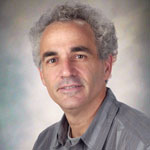
SAN ANTONIO, Texas (Nov. 16, 2010) — David S. Weiss, Ph.D., a neuroscientist whose research has advanced understanding of brain disorders such as epilepsy and the action of therapeutic drugs such as anxiety medications, is the new dean of the Graduate School of Biomedical Sciences at the UT Health Science Center San Antonio, effective Dec. 1.
William L. Henrich, M.D., MACP, president of the Health Science Center, announced the appointment in an e-mail to faculty and staff on Monday, Nov. 15. Dr. Weiss, chairman of the Health Science Center’s physiology department, becomes the fourth dean of the Graduate School since its founding in 1972. He will also hold the Dielmann Chair in Basic Biomedical Investigation.
“After an extensive national search, it was determined that Dr. Weiss’ communications skills, vision, creativity and energy make him the best choice to lead the Graduate School,” Dr. Henrich said. “I am confident that Dr. Weiss will be an outstanding leader at this critical juncture of our history.”
Dr. Weiss said: “There is no doubt that we will be facing challenging times over the next couple of years, but I am more than optimistic we can make amazing things happen here at the Health Science Center. With a president whose major mission is pushing research forward, a new School of Medicine dean (Francisco González-Scarano, M.D.) who is both a world-class clinician and scientist, a new state-of-the-art clinical building online (the Medical Arts & Research Center), and a new research structure within a year of opening (the South Texas Research Facility), this is clearly a pivotal time for us.”
The Graduate School encompasses departments of biochemistry, cellular and structural biology, microbiology and immunology, molecular medicine, pathology, pharmacology and physiology. Its members conduct hundreds of multidisciplinary research programs, successfully compete for millions of dollars in extramural funding, and provide basic science instruction to students in the School of Medicine, Dental School, School of Health Professions and Graduate School.
Dr. Weiss has served as chairman of physiology at the Health Science Center since 2005. He is also a member of the pharmacology faculty. He received his Bachelor of Arts from the University of North Carolina at Chapel Hill and his Ph.D. from Baylor College of Medicine. After a postdoctoral fellowship at the University of Miami School of Medicine, he served on the faculty of the University of South Florida School of Medicine and the University of Alabama at Birmingham.
Dr. Weiss’ primary research interest is studying the structure and function of inhibitory neurotransmitter-activated receptors in the brain. Called GABA receptors, they play a role in communication between neurons. Abnormalities in GABA-mediated inhibition have been implicated in brain disorders such as epilepsy. Dr. Weiss also investigates how GABA receptors are altered by a variety of therapeutic drugs such as sedatives, anxiety medications and anesthetics.
Dr. Weiss’ work is funded by the National Institutes of Health through 2014, and he receives significant funding from other organizations including the American Heart Association. His work has been published in top-tier journals such as Nature. He is a past recipient of the Sen. Jacob Javits Neuroscience Investigator Award from the National Institute of Neurological Disorders and Stroke.
In recent years, the Graduate School has moved to an Integrated Multidisciplinary Graduate Program that is composed of 10 tracks that reflect contemporary research in the biomedical sciences. These include the biology of aging, cancer biology, and diabetes and metabolic disorders.
“While the Graduate School must continue the momentum and move our Integrated Multidisciplinary Graduate Program and research programs forward, we also need to partner with the other schools on campus and develop more collaborative and translational science,” Dr. Weiss said.
The University of Texas Health Science Center at San Antonio, one of the country’s leading health sciences universities, ranks in the top 3 percent of all institutions worldwide receiving National Institutes of Health (NIH) funding. Research and other sponsored program activity totaled a record $259 million in fiscal year 2009. The university’s schools of medicine, nursing, dentistry, health professions and graduate biomedical sciences have produced approximately 26,000 graduates. The $739 million operating budget supports eight campuses in San Antonio, Laredo, Harlingen and Edinburg. For more information on the many ways “We make lives better®,” visit www.uthscsa.edu.

